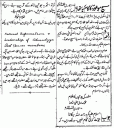Khwaja Ghulam Farid of Chachran (Bahalwalpur state, now Pakistan) was a renowned Muslim saint, with a large following, in the time of Hazrat Mirza Ghulam Ahmad and passed away before the Promised Messiah in 1904. Much to the chagrin of the Promised Messiah’s opponent ulama, the Khwaja refused to denounce him and openly declared that he was a true and sincere servant of Islam. He was not, of course, an Ahmadi, yet the Promised Messiah declared him in a poem as “the peerless one of this age in truthfulness and purity”. In Badr of 10th October 1907 a news is printed about a disciple of the Khwaja as follows:
“Hazrat Khwaja Ghulam Farid, upon whom be mercy of Allah, had true love for the Promised Messiah. This is why his disciples, when expressing love and loyalty towards the Promised Messiah, mention that they are following their late leader, may Allah have mercy on him. Recently, an honourable sufi, Khalifa Muhammad Sadiq Ali, has entered into the bai`at of the holy Hazrat. We reproduce two of his letters which will be a source of guidance for our readers.”
The words of this note shows that Khwaja Ghulam Farid, while not being an Ahmadi, is nonetheless being regarded here as a great Muslim saint
The first letter is translated below:
“O true Mahdi and true guide! assalamu alaikum wa rahmatullah wa barakatuh. Today I saw the Review of Religions, which proved and showed me that the declarations against you which appear in newspapers are written by misguided people. You are teaching us the Islam which we have forgotten. Far from being a denier and falsifier of the khatam-ur-rusul Muhammad, peace be upon him, you are one who supports and propagates his religion. You belong to that group regarding whom our Holy Messenger said that in his umma there will be ulama who will excel the prophets of the past. In a partial sense, messengership continues and will continue till the Day of Judgment. …
O true Mahdi who has been sent by God, I sincerely believe you to be true and God the Glorious is witness to it. …
O Mahdi sent by God, guide and mentor, I accept that the Holy Quran is the highest guide and teacher of Islam. However, to understand it, when knowledge and reason are not enough then a guide is required. So I take you as my guide. Teach me and show me the right path. …”
The words used by the letter writer, “You belong to that group regarding whom our Holy Messenger said that in his umma there will be ulama whom will excel the prophets of the past”, clearly show that he considers Hazrat Mirza Ghulam Ahmad as one of the saints of Islam. That is the only group spoken of thus in Hadith. The next words, “In a partial sense, messengership continues and will continue till the Day of Judgment”, equally clearly refer to the concept of muhaddasiyya, since “partial messengership” is a recognised term for that concept (based on the hadith that the true visions of a believer are a part of prophethood).

According to an article published by BBC Urdu the total number of Ahmadiyya community in India is One hundred thousand.…
----Jul 27, 18:49